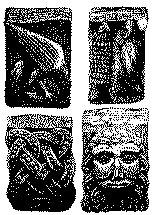

St Mary and St David
|
|
|
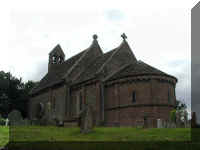 |
| General view from the south-east, showing the
rounded Romanesque apse. |
|
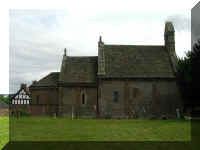 |
| Another
view from the north. |
|
|
Apart from the corner of the nave which
is Saxon, some mediaeval windows and a 19th-century restored bell-cote, the
whole church dates from the third quarter of the 12th century. It is a
particularly rich example of the late Romanesque style and shows strong
Scandanavian influence. |
|
|
|
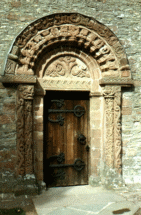
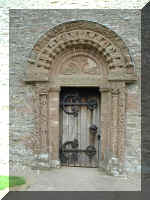 |
The south entrance
doorway showing the tympanum.
Note the
carvings of Welsh warriors in peaked Phrygian caps - the column
immediately to the left of the left door jamb.
The tympanum depicts the
Tree of Life, with
warriors in the foliage and dragons on the door jambs.
|
|
|
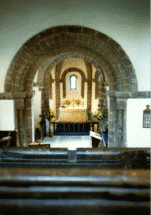
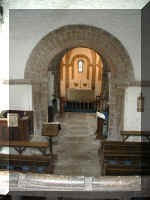 |
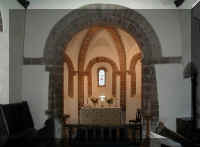 |
| The Norman chancel arch, viewed from the west
gallery, and from ground level.
|
|
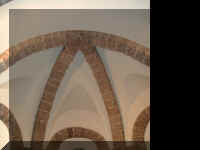 |
| Detail of the rib vaulting in the chancel
apse.
|
|
|
Regarded widely a England's most perfect Norman
church, it stands on a mound next to a ruined castle between the Wye and Dore
valleys. It was originally also next to a Benedictine priory and remains as it
was built, i.e., with nave, chancel and apse, with no aisles or tower. Nothing
has been added or taken away, and the carvings remain as they were, almost as
pristine as the time when they were completed. They cover the west and south
doorways, the chancel arch and the corbel-table which runs round the entire
church.
The carvings which form the shafts of the chancel arch
on its west side comprise three elongated figures of saints, and are unique in
England in that the sculpted figures are raised rather than incised.
|
|
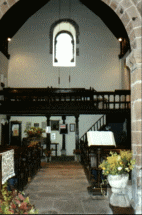 |
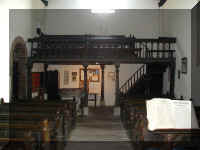 |
Two views of the
west gallery from the chancel arch.
The
gallery is Jacobean, and perhaps the most English artefact in the building.
*
* Simon Jenkins : England's 1000 Best
Churches |
|
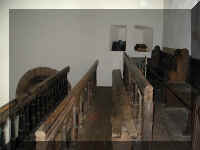 |
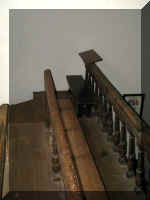 |
| Detail of the seating in the gallery.
|
|
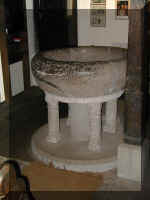 |
| The Norman font under the gallery.
|
|
|
|
| The eaves of the
church are decorated by numerous carvings on the corbels used for supporting
the roof timbers (the "corbel-table"). These range from animals, - a pig upside
down, dos rabbits, doves, - to musicians, wrestlers, acrobats, a
sheela-na-gig,
and faces of people of the time; a depiction of the life and times of the
village and its people which the church served.
Quite possibly a contemporary Beastiary
was used as a source of inspiration for the
carvings.
Above are drawings by
Reg Bolton © taken from
notelets, and the book The Sculptures of Kilpeck (both on sale in the
church), of just four of them.
|
|
| See also the web site
detailing the church and the castle at: http://www.herefordwebpages.co.uk/kilpeck.shtml |
|
|
|
Photographs: Edwin
Macadam
|
|
Please see our
Home Page for important
copyright notice
|
|
 |
|

|
|
|

|
|
|
|
|
SEARCH THIS SITE |
|
|
This
site has been constructed by, and remains the copyright of,
its authors,
Edwin and Sheila Macadam,
Shelwin, 30, Eynsham Road, Botley,
Oxford OX2 9BP
|
|
| ©
July 2001 -
|
|





